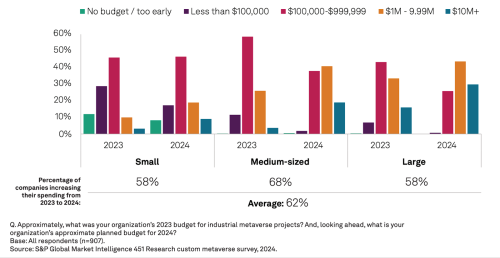Every Sixth German Would Like to Work in the Metaverse – Bitkom

While the metaverse remains a niche concept for many, a growing number of Germans are open to embracing this virtual world for education, socializing, and even for work.
A recent survey of 1,149 German residents aged 16 and over, conducted by Germany’s digital association Bitkom, shows that the metaverse is gaining traction in Germany, with a majority of Germans (54%) now familiar with the concept.
A year ago, only 41% of respondents were familiar with the metaverse. Currently, roughly one in every seven (13 %) respondents claims to fully understand this concept. Another 20 % have at least a rough idea of what the metaverse is, while 21 % are aware of it but cannot precisely explain it.
Erstmals kennt eine Mehrheit (54%) das #Metaverse. 🥽
🤔 Aber nur 13% können genau #erklären, was es ist.
15% würden dort #arbeiten, 24% #Freunde treffen. 🙋♂️
Gleichzeitig gibt’s #Skepsis: 63% befürchten, dass eine #Parallelwelt entstehen könnte. 👇https://t.co/I4LfZ7jCmU
— Bitkom (@Bitkom) December 17, 2024
Metaverse for Work and Play
The survey also found that almost every sixth respondent (15%) would like to work in the metaverse. Attending meetings, collaborating on projects, and even training for new skills all within a shared virtual environment – this new virtual world of work is becoming more appealing to a segment of the German population.
Many respondents are also open to using the metaverse for a variety of personal activities. For example, a quarter (24%) would like to meet friends in the metaverse. Nearly one in five is interested in attending virtual schools or universities (18%) and shopping in the digital realm (17%). 12% of respondents believe that attending concerts with friends will eventually move to virtual venues.
Furthermore, 10% of respondents can even imagine spending a significant portion of their lives in the metaverse, while roughly one-fifth (21 %) would be willing to purchase special glasses for metaverse use.
Skepticism Surrounds the Metaverse
However, the survey also revealed a degree of skepticism surrounding the metaverse. Two-thirds (66%) of German respondents expressed concerns about the difficulty of verifying identities within virtual environments, and 63% feared the emergence of a virtual parallel world that could isolate individuals from real-life interactions.
These concerns highlight the importance of addressing issues related to security, privacy, and responsible use as the metaverse continues to evolve.
Metaverse: A Growing Force in the German Economy
The metaverse is also becoming relevant to the German economy, as a Bitkom survey published in August revealed that a third of the 605 German companies surveyed consider the metaverse to be a critical technology for their future.
While only a few companies have explored the metaverse, this number has more than doubled in the past two years, from 6% to 13%.
A promising 22% of surveyed companies expect to invest in the metaverse after 2025.
However, a lack of practical applications, technological immaturity, regulatory uncertainties, and a shortage of skilled talent are still major obstacles to overcome.
Global Investment in the Industrial Metaverse Soars
On a global level, an October survey of 907 companies in seven countries – Australia, Canada, China, Germany, India, the UK and the US – demonstrates that investment in the industrial metaverse has increased significantly through 2024, with 62% of global companies increasing their spending on the technology.

Metaverse spending comparison by company size (2023 vs. 2024). Source: Industrial Metaverse Research Study
The study, conducted by S&P Global Market Intelligence 451 Research and Siemens, the German industrial automation and software company, also shows that 81% of companies are either implementing, testing or planning to implement industrial metaverse technologies.
Nearly two-thirds of these companies are employing or testing solutions to enhance product development, operations, workforce management, and supply chain management. The remaining companies are making strategic investments in technologies like digital twins, industrial artificial intelligence (AI) or the Internet of Things (IoT) and planning to implement them in specific industrial metaverse solutions within the next three years.
Source: cryptonews.com



